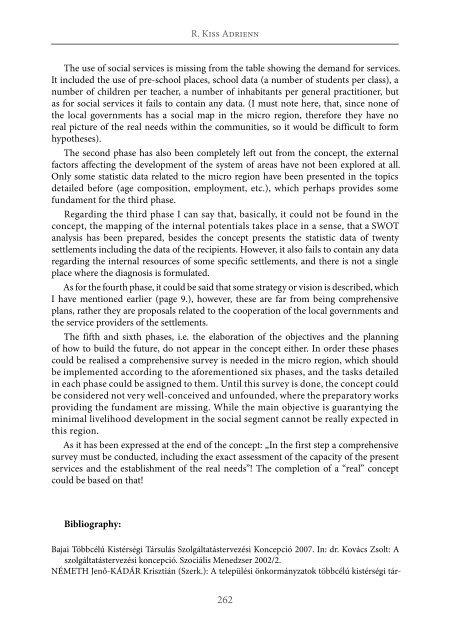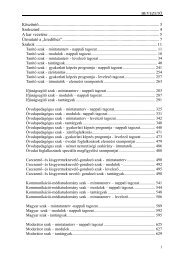ACTA SZEKSZARDIENSIUM - Pécsi Tudományegyetem Illyés Gyula ...
ACTA SZEKSZARDIENSIUM - Pécsi Tudományegyetem Illyés Gyula ...
ACTA SZEKSZARDIENSIUM - Pécsi Tudományegyetem Illyés Gyula ...
You also want an ePaper? Increase the reach of your titles
YUMPU automatically turns print PDFs into web optimized ePapers that Google loves.
R. Kiss Adrienn<br />
The use of social services is missing from the table showing the demand for services.<br />
It included the use of pre-school places, school data (a number of students per class), a<br />
number of children per teacher, a number of inhabitants per general practitioner, but<br />
as for social services it fails to contain any data. (I must note here, that, since none of<br />
the local governments has a social map in the micro region, therefore they have no<br />
real picture of the real needs within the communities, so it would be difficult to form<br />
hypotheses).<br />
The second phase has also been completely left out from the concept, the external<br />
factors affecting the development of the system of areas have not been explored at all.<br />
Only some statistic data related to the micro region have been presented in the topics<br />
detailed before (age composition, employment, etc.), which perhaps provides some<br />
fundament for the third phase.<br />
Regarding the third phase I can say that, basically, it could not be found in the<br />
concept, the mapping of the internal potentials takes place in a sense, that a SWOT<br />
analysis has been prepared, besides the concept presents the statistic data of twenty<br />
settlements including the data of the recipients. However, it also fails to contain any data<br />
regarding the internal resources of some specific settlements, and there is not a single<br />
place where the diagnosis is formulated.<br />
As for the fourth phase, it could be said that some strategy or vision is described, which<br />
I have mentioned earlier (page 9.), however, these are far from being comprehensive<br />
plans, rather they are proposals related to the cooperation of the local governments and<br />
the service providers of the settlements.<br />
The fifth and sixth phases, i.e. the elaboration of the objectives and the planning<br />
of how to build the future, do not appear in the concept either. In order these phases<br />
could be realised a comprehensive survey is needed in the micro region, which should<br />
be implemented according to the aforementioned six phases, and the tasks detailed<br />
in each phase could be assigned to them. Until this survey is done, the concept could<br />
be considered not very well-conceived and unfounded, where the preparatory works<br />
providing the fundament are missing. While the main objective is guarantying the<br />
minimal livelihood development in the social segment cannot be really expected in<br />
this region.<br />
As it has been expressed at the end of the concept: „In the first step a comprehensive<br />
survey must be conducted, including the exact assessment of the capacity of the present<br />
services and the establishment of the real needs”! The completion of a “real” concept<br />
could be based on that!<br />
Bibliography:<br />
Bajai Többcélú Kistérségi Társulás Szolgáltatástervezési Koncepció 2007. In: dr. Kovács Zsolt: A<br />
szolgáltatástervezési koncepció. Szociális Menedzser 2002/2.<br />
NÉMETH Jenő-KÁDÁR Krisztián (Szerk.): A települési önkormányzatok többcélú kistérségi tár-<br />
262




